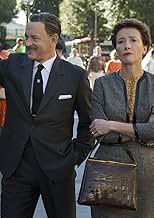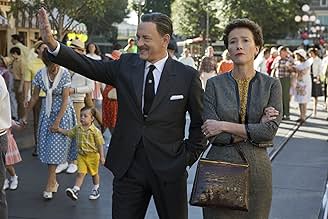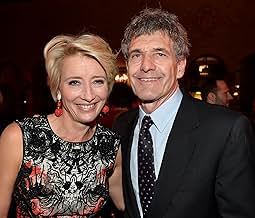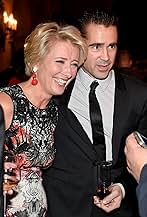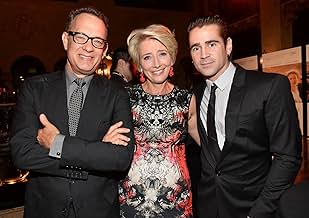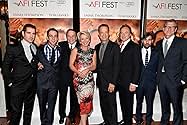Dans l'ombre de Mary : La Promesse de Walt Disney
Titre original : Saving Mr. Banks
- 2013
- Tous publics
- 2h 5min
L'écrivaine P.L. Travers revient sur son enfance après une rencontre à contrecoeur avec Walt Disney, qui cherche à adapter ses livres de Mary Poppins pour le grand écran.L'écrivaine P.L. Travers revient sur son enfance après une rencontre à contrecoeur avec Walt Disney, qui cherche à adapter ses livres de Mary Poppins pour le grand écran.L'écrivaine P.L. Travers revient sur son enfance après une rencontre à contrecoeur avec Walt Disney, qui cherche à adapter ses livres de Mary Poppins pour le grand écran.
- Réalisation
- Scénario
- Casting principal
- Nommé pour 1 Oscar
- 13 victoires et 74 nominations au total
Fuschia Sumner
- Flight Attendant
- (as Fuschia Kate Sumner)
Avis à la une
i attended a pre-screening of "Saving Mr. Banks" last night in Dallas. while i had been looking forward to the film, i had my reservations. after all, Johnny Hancock (director) was behind "The Blind Side," which i found much too schmaltzy and watered-down for my taste. also, this was a movie about Walt Disney being produced by his company - so how honest would it be about the story behind the making of the masterpiece "Mary Poppins"? would it settle for predictable mellow-drama (yes, i meant to spell it that way) and glorify dear Uncle Walt as perfect and demonize Mrs. Travers as a cold, soulless spoilsport? thankfully, the answer to that is a resounding "no."
while it surely takes artistic license with history, the film as a whole is surprisingly great. there's not a weak moment throughout, not a second where i wasn't entertained and wanting to find out what would come next. this film (rated PG-13) surprises with many of the thematic issues it tackles, including alcoholism, loss - and we even get a brief glimpse of a smoking Mr. Disney (hey, it was the 60s).
Emma Thompson has always been a strong performer though her screen time has waned over the last decade and a half, but here she gives a performance that is worthy of awards attention. As Mrs. P.L. Travers, she is an author as protective as her life's work as a mother is for a child and is dealing with demons nearly forgotten. Mr. Hanks too carries his own playing the iconic and visionary Disney at the top of his game, trying to honor a promise to his daughters while also add to his impressive repertoire of cinematic achievements.
this is not really a film to take your Poppins-loving tykes to. this is the Disney film for mom and dad to enjoy. "Saving Mr. Banks" will probably be remembered as one of the best films of 2013, and for good reason.
while it surely takes artistic license with history, the film as a whole is surprisingly great. there's not a weak moment throughout, not a second where i wasn't entertained and wanting to find out what would come next. this film (rated PG-13) surprises with many of the thematic issues it tackles, including alcoholism, loss - and we even get a brief glimpse of a smoking Mr. Disney (hey, it was the 60s).
Emma Thompson has always been a strong performer though her screen time has waned over the last decade and a half, but here she gives a performance that is worthy of awards attention. As Mrs. P.L. Travers, she is an author as protective as her life's work as a mother is for a child and is dealing with demons nearly forgotten. Mr. Hanks too carries his own playing the iconic and visionary Disney at the top of his game, trying to honor a promise to his daughters while also add to his impressive repertoire of cinematic achievements.
this is not really a film to take your Poppins-loving tykes to. this is the Disney film for mom and dad to enjoy. "Saving Mr. Banks" will probably be remembered as one of the best films of 2013, and for good reason.
Once upon a time (seeing as though that's how all fairy tales seem to start), there lived a boy from Missouri, called Walt Disney. This boy had a piece of paper with a mere sketch of a mouse upon it. Who ever would have thought that this was to be the start of such a great legacy? In 1961, Walt Disney invited P.L Travers, the author of "Mary Poppins", to his California studios to discuss the possibility of acquiring the rights to her book - a discussion that Mr. Disney had initially sparked twenty years prior. For those two decades, the proud author refused to depart with her precious work in fear of Hollywood's mutilation of it and repeatedly told Mr. Persistent to go 'fly a kite
up to the highest heights'. However, when sales of her book begin to dwindle and with a rough economic climate ahead, Travers reluctantly agreed to travel across the Atlantic to hear what the impresario had to say. This untold backstory of how Travers' classic work of literature made it to the big screen provides the substance for John Lee Hancock's Saving Mr. Banks. Here, we have an American icon that plays an American icon. Two-time Academy Award winner Tom Hanks delivers extraordinary sense of character as he renders Mr. Walt Disney with expert attention to detail. "There's a lot of voice work, the way he walks, the body positions, the way he holds his hands, the way he touches his moustache. How he phrases things and lets sentences roll off the end", Hancock remarks - and so Tom Hanks becomes the public face for Walt Disney and we learn of the man behind the mask (with two fluffy ears). Our central protagonist is Mrs. P. L Travers, played by Emma Thompson (who similarly boasts two Academy Awards). "She was a wonderful case study, requiring so many different shades. She was just so complex. She's one of the most complicated people I've ever encountered", says the British actress. Her rendition of a tetchy and cantankerous author who's plagued by the memories of her past is brilliantly executed. As narrative flashbacks delve into Mrs. Travers' childhood, we soon realise the true depth of her literary creation, Mary Poppins. Mr. Banks explores the bond between a young Travers (then Helen) and her drunkard father, Travers Goff (exceptionally played by Colin Farrell). Like a puzzle, the story is pieced together, bit by bit and we learn that her deep-seated adoration for her father is what lies at the heart of her magical masterpiece. Demonstrating that her novel holds such personal significance, Travers continues to exercises a stubborn reluctance to hand the rights to her book over to what she considers to be a dollar-printing machine. The straight-talking novelist is repulsed by Disney's empire and this is only intensified when the entertainment wizard showers her in all kinds of ridiculous merchandise. As Walt Disney haplessly pursues Travers, unsettling the adamant writer with his vision of the film, it seems that he will never obtain the rights to make the movie of Mary Poppins. We are, of course, watching this in hindsight and the knowledge that the book was made into a successful film adds a magical quality to the experience and permits laughter as it plays on dramatic irony; and there are some real gems for the Disney die-hards. Walt Disney made a promise to his daughter to make the movie of Mary Poppins. As the likelihood of fulfilling this promise fades into the distance, the entertainment-guru reaches into his own childhood and discovers a new, more personal connection to the emotionally troubled Travers. In order to break away from a life dictated by her past, Travers agrees to sign the waiver so that one the most lovable films in cinematic history can be made. This biographical dramedy stands as a poetic tale of hope, which ultimately gives testament to the might of the mouse house and conveys the magical idea that everybody has a story to tell. Making memories is what Disney is all about and for its 125-minute runtime, we re-visit old memories and we also create new ones. With all the conventions of a family film (after all, this is Disney), Saving Mr. Banks is supercalifragilisticexpialidocious! (Couldn't resist).
As with 'The Day of the Jackal', anyone with a basic knowledge of history will know how this ends; just as anyone familiar with the film that eventually emerged from this 1961 meeting of an irresistible force and an immovable object will know both the outcome and who won the creative battles.
We actually learn early on when she laments that "I want to keep my house" that Disney had Travers over a barrel; while the fact that there was never a sequel to 'Mary Poppins' tells us all we need to know about what she reallly thought of the film that emerged.
We actually learn early on when she laments that "I want to keep my house" that Disney had Travers over a barrel; while the fact that there was never a sequel to 'Mary Poppins' tells us all we need to know about what she reallly thought of the film that emerged.
"Saving Mr. Banks" is an exquisite film. It draws you in with the delightful reality of Disney as well as the triumphantly stark reality (inasmuch as it is reality; I do lack her background) of Mrs. Travers. I purposely leave out parts of the film for the sake of the movie-goer, but let me say how delightful the songs are, the people are, the displays of emotion-- my part as well, as I nearly cried and fully laughed at certain points throughout. The film speaks to me and it feels complete in its currency-- tuppence, if you will-- in taking Mrs. Travers' story and embellishing it with the truth of the creators' (both Travers and Disney, for the part he has in the creation of the film) lives. The lives of the characters-- and I do mean most people seen on screen, in particular the driver and Mrs. Travers' mother-- are well-told and well-lived, and spark a certain comfort and warmth, even in the cold of their realities and harsher backstories. I believe the film has done its job beautifully, and I wouldn't change it for the world. Even the animated penguins, although for me there is still my deep and abiding love for their real counterparts.
This movie is much more than and definitely deeper than one would suspect from the 'syrupy' trailers most people have seen. The understory, gradually revealing the early life of P.L. Travers, the author of Mary Poppins, and depicting how the people in her dysfunctional family led her to write Mary Poppins, is the true core of this movie. I will never see Mary Poppins in quite the same way. All of the acting is superior, and the score is excellent. This is not the shallow, childlike movie that many will expect. I would not recommend it for children 11 and under, depending on the child. Otherwise, I highly recommend this movie, even if you are not a big fan of the original Mary Poppins film.
Le saviez-vous
- AnecdotesP.L. Travers never did warm up to the song "Let's Go Fly a Kite" as depicted in this movie. According to Richard M. Sherman, it was "Feed the Birds" that won her over.
- GaffesThe other drivers at the airport hold signs bearing logos of Warner Brothers and MGM adopted sometime after 1961.
- Citations
Walt Disney: George Banks and all he stands for will be saved. Maybe not in life, but in imagination. Because that's what we storytellers do. We restore order with imagination. We instill hope again and again and again.
- Crédits fousThe credits also have an actual audio recording of P.L. Travers conversing with the filmmakers like the ones depicted in the film.
- Bandes originalesChim, Chim, Cher-ee
Written by Richard M. Sherman (as Richard Sherman) and Robert B. Sherman (as Robert Sherman)
Performed by Randy Kerber
Meilleurs choix
Connectez-vous pour évaluer et suivre la liste de favoris afin de recevoir des recommandations personnalisées
Détails
- Date de sortie
- Pays d’origine
- Site officiel
- Langue
- Aussi connu sous le nom de
- El sueño de Walt
- Lieux de tournage
- Sociétés de production
- Voir plus de crédits d'entreprise sur IMDbPro
Box-office
- Budget
- 35 000 000 $US (estimé)
- Montant brut aux États-Unis et au Canada
- 83 301 580 $US
- Week-end de sortie aux États-Unis et au Canada
- 413 373 $US
- 15 déc. 2013
- Montant brut mondial
- 117 867 984 $US
- Durée
- 2h 5min(125 min)
- Couleur
- Mixage
- Rapport de forme
- 2.39 : 1
Contribuer à cette page
Suggérer une modification ou ajouter du contenu manquant







